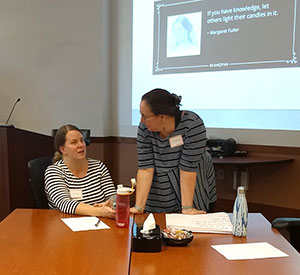Twenty-seven faculty, residents and staff from the UW Department of Family Medicine and Community Health’s (DFMCH) Madison residency program and Baraboo Rural Training Track began a deeper exploration of how identity, privilege and marginalization can impact learning during a core faculty retreat on September 14, 2018, at the Fluno Center.

Above, DFMCH teaching faculty Jensena Carlson, MD, and Sarina Schrager, MD, during a break at the core faculty retreat on September 14.
They participated in an adapted version of a workshop, “Teaching Inclusively,” co-facilitated by Don Gillian-Daniel, PhD, from the UW-Madison Collaborative for Advancing Learning and Teaching, and Anne Stahr, MS, from the UW School of Medicine and Public Health (SMPH) Office of Faculty Affairs and Development.
First, Start with Yourself
Participants began by examining components of their own professional identities. They mapped factors such as medical specialty, academic rank, class, national origin, sexual orientation and physical characteristics in a pie chart, with larger slices representing the aspects that stand out most to them.
At the same time, they discussed which of those factors were culturally more dominant or subordinate, raising awareness among those who represent the majority, and affirming those who are minoritized.
“You can’t do inclusive teaching unless you first start with yourself,” explained Gillian-Daniel. “What aspects of identity are most salient to you, and are you aware of this when you walk into a teaching space?”
‘Improv’ Responses to Microaggression
Gillian-Daniel and Stahr showed participants how they can promote inclusive teaching through:
- Instructor-learner interactions, such as finding out and using a learner’s name, or modeling productive disagreement;
- Learner-learner interactions, such as deliberately structuring interactions and group work to not isolate underrepresented students; and
- Learner-content interactions, such as using diverse examples to illustrate concepts.
They then partnered up and acted out a hypothetical instructor-learner scenario in which a white resident makes assumptions about the causes of a black patient’s diabetes, while also mispronouncing the patient’s name.
Participants had to verbally respond to the microaggressions in real time. After the experience, they debriefed in table groups to problem solve and offer suggestions for improvement.
“It’s a little like improv,” noted Stahr. “Instead of talking about what you might say in a certain situation, you have to act in the moment. Sometimes our first thoughts, though well intentioned, may not be the best, so this is an opportunity to learn through that experience.”
‘The Work is Not Done’
Madison residency program associate director Thomas Hahn, MD, says that the concepts covered in the workshop have been a leading topic at recent national family medicine education meetings.
While considering ways to create a similar educational experience for DFMCH faculty and residents, he and several colleagues participated in “Teaching Inclusively” through the SMPH’s longitudinal teacher/coach program.
“They were doing exactly what we wanted,” notes Dr. Hahn. “It made sense to bring in local experts.”
Responses to the workshop were positive, with one participant calling it “outstanding,” and others expressing interest in follow-up sessions.
For now, the DFMCH will offer the workshop to all Madison and Baraboo residents on October 25 and 26. Dr. Hahn hopes to offer more learner-focused sessions in the future, and also partner on new ones on responding to microaggressions in patient-care settings.
“The work is not done,” continues Dr. Hahn. “We will be able to apply what we have learned to create more inclusive environments for learners and patients, and we still have much more to learn.”
To learn more about the workshop at the DFMCH, contact Dr. Hahn at thomas.hahn@fammed.wisc.edu.
At the SMPH, the workshop was part of this year’s Medical Education Day and is offered through two-part sessions on October 9 and 23. Some of its content is also being woven into the ForWard curriculum for medical students. To learn more about future offerings at the SMPH, contact Anne Stahr at stahr2@wisc.edu.
Published: October 2018
